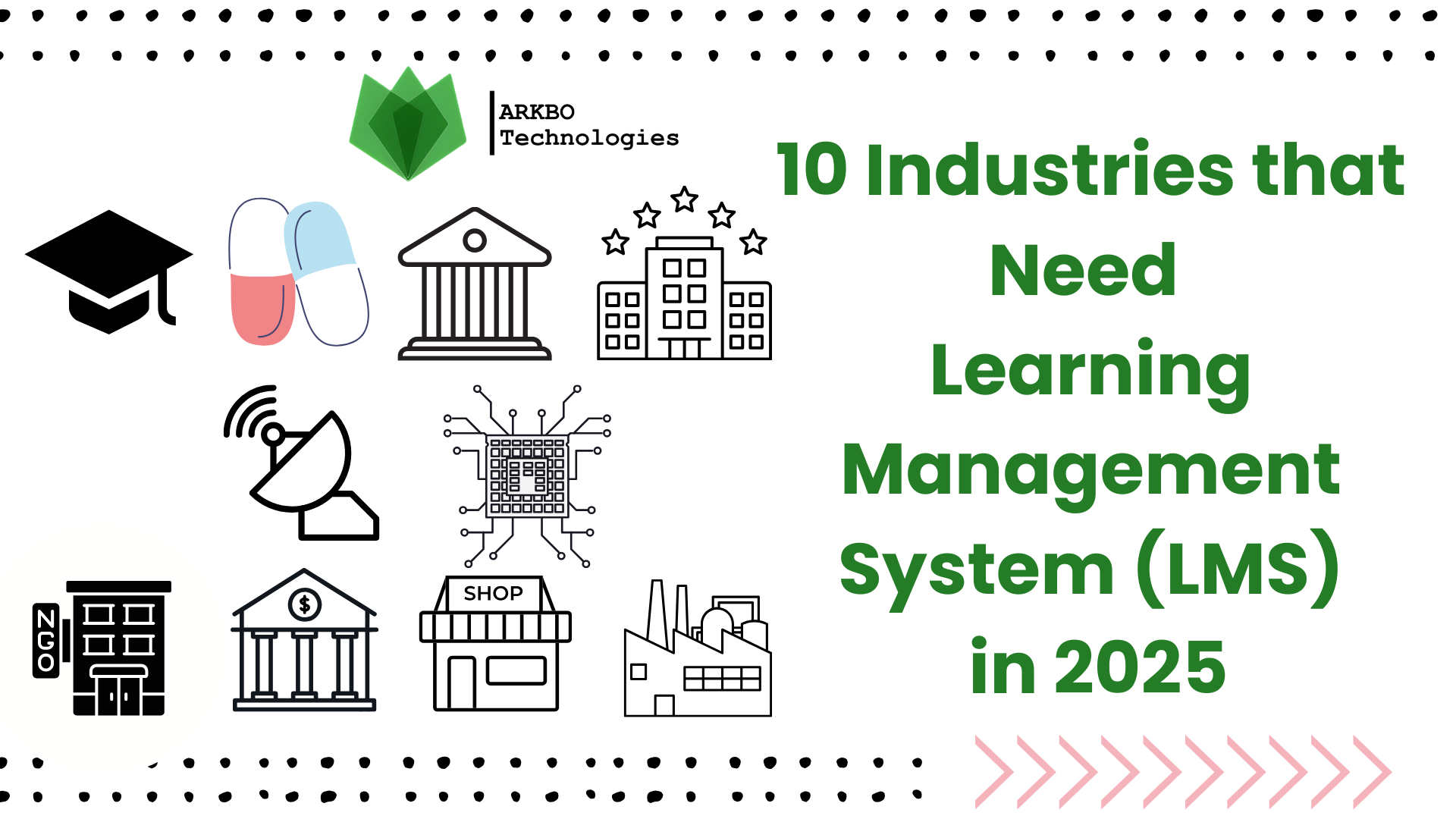
In 1995, only 4% of organisations used online learning, but now, 90% of organisations are using some form of e-learning in their training(GrowthEngineering). This indicates that organizations are concerned about their workforce, their skills, and productivity. Does this mean every industry needs an LMS in 2025?
Well, not every industry needs it, but it can be beneficial for them. They can certainly offer inclusive and equal learning experiences with LMS implementation.
In this blog, we will dive into 10 industries that should implement an LMS system.
Let’s look into the ten industries that must implement an LMS system to make the associated individuals skilled.
90% of students like eLearning to classroom-based learning, while 85% said that their online learning experience was better or satisfactory than traditional/face-to-face classes (elearningindustry). Thus, schools, colleges, universities, and training institutes can introduce an LMS system to modernize their teaching and learning experience.

Further, an LMS platform supports self-paced and personalized learning for students as they can show their knowledge and understanding via slide presentation, video or podcast, or art project. For teachers, LMS aids in efficient curriculum management (the selection of teaching plans and content). Teachers can also have the training and support from LMS to efficiently deliver the curriculum to students. Teachers can also use LMS tools such as data analytics to identify struggling students and improve their outcomes.
All in all, LMS aids in modern education, enhances student-teacher engagement, improves performance, and achieves long-term learning success.
The healthcare industry is a rapidly evolving field that requires compliance and continuous workforce training. Thus, a competent LMS is required. With a healthcare LMS, healthcare institutions such as hospitals, medical practices, and health tech firms can provide training to nurses, doctors, medical students, and other related medical professionals.
Not just healthcare professionals, LMS can also be used to educate patients. Patients can attend an online disease management course or a post-surgery care course. They can also help patients access their medical records online.
The IT industry is a booming industry that requires IT professionals to make constant improvements in order to bring better products. Not just that, keeping up with new programming languages, tools, cybersecurity protocols, and frameworks requires professionals to upskill regularly with continuous learning. Such learning for onsite, remote, and hybrid teams is feasible through a Learning Management System (LMS).

An LMS provides gamified learning, simulations, and interactive modules, which are ideal for tech professionals who prefer hands-on, practical learning experiences. The team can enjoy compliance and regulatory training and acquire mandatory compliance standards, and earn certifications.
In today’s time, the retail companies have a digital store, as well as multiple onsite stores. To provide the best services to customers, sales associates, retail managers, warehouse associates, and employees require consistent training.
Let’s take an example:
Some retail employees may not be familiar with the way to talk to customers, use the systems correctly, or know what to do in tricky situations. Thus, if training isn’t clear and consistent, customers won't have a good experience, and the business can lose money.

By using online and self-paced learning offered by the retail LMS. Using the LMS system, retailers can teach, manage, and oversee their store-based staff and continually adapt and upskill to their clients’ demands.
The manufacturing industry requires ground-level employees to operate machinery, assemble products, inspect quality, follow safety procedures, and maintain a clean workspace.
To meet all such requirements, proper training is essential to ensure safety, consistency, and productivity on the factory floor. To make the training process efficient, standardized, engaging, and compliant Learning Management System (LMS) is needed.

An LMS makes training easy, organized, and repeatable. The workers can access the machine operating and maintenance lessons anytime and start learning right away, while managers can also see who has finished their training and who still needs to do it again.
The continuous training makes employees skilled and confident, which then results in reducing accidents, improving product quality, keeping the workplace running smoothly, and meeting safety and compliance standards.
Finance and banks hold strict rules as they handle customers’ banking information, and constantly update their services and technology. Manual or Inconsistent training for banking employees can lead to serious issues like compliance violations, data security risks, customer service problems, and human errors.

With an online centralized LMS, the finance industry can facilitate training, onboarding, and professional development of employees. Constant learning keeps employees well-informed, compliant with regulations, and equipped with the necessary skills to provide excellent customer service.
Government offices and public institutions often have large teams, strict rules, and ever-changing policies. It is sad to say, but most of the government offices still rely on manual training, which is time-consuming, costly, and hard to track.

Using an LMS system, government employees can have timely training on laws, procedures, digital security, and customer service, while the institution can save time and money by reducing the need for repeated in-person training. With this system, supervisors/organisations with numerous tools to track and analyse the performance of the employees regularly.
The hospitality industry relies on exceptional guest experiences, which can be made possible with well-trained staff. For training in hospitality businesses, in-person training sessions, shadowing, and manuals are used. In addition, seasonal hiring and language barriers make it even harder to train teams effectively and quickly. These issues can be resolved with an LMS system.
LMS serves as a centralized platform that delivers uniform training materials to all employees. Office staff can access training materials anytime, anywhere. The newly hired employees can speed up their onboarding modules, while experienced staff can take courses or learn new skills. Also, the multilingual support of an LMS contributes to overcoming communication barriers.
The telecommunication industry deals with phone networks, internet access, mobile connectivity, and data transmission. To provide their services, telecommunication organizations must have well-trained employees.

Manual training in the telecommunication sector leads to knowledge gaps, poor customer service, technical errors, and non-compliance. By using an LMS system, telecom companies can deliver fast, consistent, and up-to-date training across the entire workforce and keep their teams skilled in a rapidly evolving industry.
NGOs and nonprofit organizations work with diverse teams, and volunteers spread across different regions. To achieve their goals, they organize various programs that are to be conducted and managed by the staff and volunteers. Thus, the staff and volunteers must be well-versed in the NGO’s prime focus areas, such as community engagement, fundraising, and project management.

NGOs can implement an LMS system to minimize the cost of on-site training and expedite the training process. With this system, volunteers can take classes for disaster management, first aid, emergency response, communication skills, and program implementation.
In 2025, various industries are growing more complex and fast-paced; they need to stop traditional training methods and switch to online learning. Thus, to offer online learning for employees, organizations must check for signs that their company needs an LMS system.
After checking the signs, you need to check for possible mistakes you can make when moving to a learning management system. Once you introduce LMS to your workforce, your employees stay informed, skilled, compliant, and ready to meet evolving job demands. It streamlines training, supports growth, and empowers organizations to confidently deliver better results.
ARKBO LMS, the best LMS in Nepal, is the ideal LMS if you want to empower your workforce. From healthcare to manufacturing, our LMS can serve every industry. Team ARKBO and the related authority can work together to determine the skills gap, create custom content, provide personalized learning experiences, and more.
Book a FREE demo & consultation with the ARKBO team. Contact us for further information
Read More: Complete Guide to Learning Management System